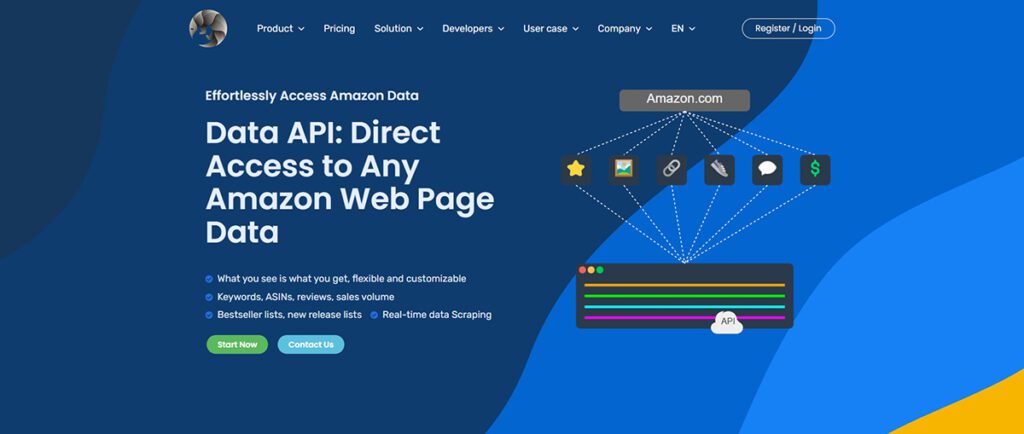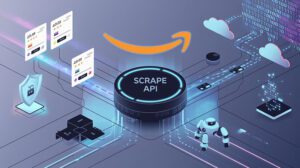Introduction
Data as a Key Asset in the AI Era
In today’s digital age, data is the cornerstone of business decision-making and innovation. The advancement of AI and machine learning heavily relies on the availability of large volumes of high-quality data. The efficiency of data acquisition and processing directly impacts the training and predictive capabilities of AI models. Therefore, having a robust data collection and analysis system is crucial for businesses to stay competitive in the market.
Pangolin’s Mission and Vision
As a specialized provider of data solutions, Pangolin is dedicated to offering efficient and flexible tools that empower clients to gain a competitive edge in the data-driven era. Our mission is to simplify and enhance the process of data acquisition and analysis through technological innovation, enabling businesses to thrive in a competitive market.
The Birth of Data API and Its Market Positioning
After launching the powerful Scrape API and Pangolin Collector, we recognized that our customers’ needs had evolved beyond simply scraping web pages. They now demand direct access to parsed and structured data. In response to this demand, Pangolin has introduced the Data API. This new product not only offers pre-parsed data but also significantly reduces the workload required for data processing, making the analysis process more efficient and user-friendly.
I. Understanding Data API
What is Data API?
The Data API is an advanced data service interface that allows users to directly access parsed and structured web data. This means users no longer need to manually process raw HTML data; instead, they can immediately utilize structured data for analysis and decision-making. The Data API is designed to simplify data acquisition processes, reduce processing costs, and enhance data utilization efficiency.
Core Functions and Service Scope of Data API
The Data API offers the following core functions:
- Direct Data Retrieval: Users can directly obtain specific web data through API calls, eliminating the need for manual parsing.
- High Customizability: The API provides customizable data output formats based on user requirements, catering to various business needs.
- Scalable Data Processing: It supports high-concurrency data requests, ensuring stable and real-time data access.
II. The Relationship Between Data API and Scrape API
Overview of Scrape API
The Scrape API is a powerful data scraping tool developed by Pangolin that enables users to obtain raw HTML content from web pages. Users can then parse this raw data according to their needs to extract the required information. The Scrape API is ideal for users with strong technical capabilities who need deep customization in data processing.
Evolution and Development of Data API
The Data API was developed as an evolution of the Scrape API, aimed at providing a more convenient solution for users who wish to simplify the data processing process. Unlike the Scrape API, the Data API delivers parsed and structured data ready for immediate use, significantly reducing the need for additional development resources for data parsing.
Technical and Service-Level Connections
While Data API and Scrape API differ in service delivery, they share a close technical connection. The Data API inherits the robust data scraping capabilities of the Scrape API and integrates advanced parsing algorithms to provide structured data output. This ensures that the Data API maintains data scraping performance while significantly enhancing the user experience.
III. Comparative Analysis of Data API and Scrape API
Detailed Functional Differences
The primary difference between Data API and Scrape API lies in the depth of data processing and the format of data output:
- Scrape API: Provides raw web content, suitable for users who need custom parsing.
- Data API: Provides pre-parsed, structured data, ideal for users who need ready-to-use data.
Depth and Breadth of Data Processing
The Data API offers clear advantages in the depth and breadth of data processing. It can not only parse multi-layered nested data within web pages but also customize different data structures based on user needs. On the other hand, the Scrape API offers greater freedom, allowing users to fully control the data processing flow.
User Experience and Ease of Operation
The Data API is designed with simplicity in mind. By reducing the steps required for data processing, it allows users to quickly access the data they need and apply it directly to their business scenarios. In contrast, the Scrape API requires users to have a certain level of technical expertise to fully utilize its powerful data scraping capabilities.
IV. In-Depth Analysis of Data API’s Advantages
Automation and Efficiency in Data Parsing
One of the significant advantages of Data API is its ability to automate data parsing. Through its built-in parsing engine, the Data API can automatically extract key information from web pages and convert it into structured data. This greatly reduces the manual effort required for data parsing. Furthermore, the efficient parsing algorithms ensure both the speed and accuracy of data processing, making it ideal for business scenarios requiring quick decisions.
Customization and Flexibility
The Data API offers a high degree of flexibility and customization. Users can select different data fields and output formats according to their business needs. This flexibility allows the Data API to adapt to various complex application scenarios, such as market analysis and user behavior analysis. Additionally, users can adjust the API call frequency and data update frequency based on their needs, ensuring data timeliness and relevance.
Broad User Adaptability
Although the Data API requires some technical knowledge, its ease of use makes it suitable for a wide range of users. Both small and large enterprises can easily access the structured data they need without significant investment in development resources. This broad adaptability makes the Data API attractive and accessible to a wide market.
Cost-Effectiveness and On-Demand Service
The Data API uses a tiered, pay-as-you-go pricing model, allowing users to pay based on actual usage. This flexible billing method enables users to scale their data consumption according to their business needs, avoiding unnecessary costs. For businesses that require extensive data support but have limited budgets, the Data API offers a cost-effective solution.
V. Addressing Industry Pain Points with Data API
Complexity and Challenges of Raw Data Processing
In a data-driven business environment, one of the major challenges is extracting useful information from complex raw data. Traditional data scraping tools usually only provide raw data, which means users need to invest significant time and resources in data parsing. The Data API addresses this issue by providing structured, pre-parsed data, making the data processing workflow more efficient.
Challenges of Data Timeliness and Accuracy
In many industries, the timeliness and accuracy of data are critical to decision-making success. The Data API ensures the delivery of accurate, real-time data through efficient scraping and parsing mechanisms, helping businesses maintain a competitive edge. Whether it’s monitoring e-commerce prices or analyzing market trends, the Data API provides reliable data support.
Technical Barriers and User Expertise Limitations
For many businesses, the technical barriers associated with data scraping and parsing can be high, often requiring a dedicated development team. The Data API simplifies the data acquisition process, lowering the technical barriers for users and making it easy for businesses without specialized development teams to access and utilize data. This convenience significantly broadens the Data API’s user base.
VI. Use Cases and Applications of Data API
E-commerce Data Analysis and Market Trend Prediction
In the e-commerce industry, understanding market trends and competitor actions is key to developing effective marketing strategies. The Data API provides real-time market data, enabling businesses to analyze trends and adjust product strategies and pricing accordingly. For instance, an e-commerce platform using Data API could gather competitor pricing and customer review data, optimizing its product positioning and increasing market share.
Automated Collection and Processing of Competitive Intelligence
The collection and analysis of competitive intelligence are crucial for strategic planning. The Data API automates the process of data scraping and parsing, making the collection of competitive intelligence more efficient. For example, a retail company might use the Data API to automatically collect promotional information from competitors and analyze it alongside internal sales data, successfully predicting and responding to a price war.
Price Monitoring Strategies and Dynamic Adjustments
Price monitoring is a key strategy for enhancing competitiveness. Through the Data API, businesses can monitor competitor prices in real-time and adjust their pricing strategies based on market dynamics. This real-time price monitoring not only helps businesses maintain price competitiveness but also avoids unnecessary price wars, improving profit margins.
In-Depth User Feedback Analysis and Product Optimization
Understanding user feedback is essential for product optimization. The Data API analyzes user comments and feedback, helping businesses gain deeper insights into user needs and pain points. For example, a tech company might use the Data API to analyze feedback on a new product, identify design flaws, and quickly make improvements, thereby enhancing the product’s market acceptance.
VII. Comprehensive Evaluation and Market Positioning of Data API
Objective Evaluation of Product Strengths and Weaknesses
The Data API has gained widespread recognition for its efficient data parsing capabilities and flexible customization services. However, it still requires users to have a certain level of technical expertise, which may limit its appeal to some small and medium-sized enterprises. Moving forward, Pangolin might need to further optimize the user experience of the Data API to lower its entry barrier and attract more non-technical business clients.
Target Market and Precise Customer Positioning
The primary target market for the Data API includes medium to large enterprises and professional users with data analysis needs. It holds significant market potential in industries such as e-commerce, retail, and finance, where real-time data support is essential. Additionally, small to medium-sized enterprises looking to drive business growth through data are also important potential customers for the Data API.
Competitive Analysis of Existing Solutions
Compared to other data scraping and parsing tools on the market, the Data API has clear competitive advantages. It not only offers more efficient parsing capabilities but also provides customizable services tailored to customer needs, positioning it favorably in the market. Additionally, Pangolin’s brand reputation and technological expertise provide strong support for the market promotion of the Data API.
VIII. Future Outlook and Industry Impact of Data API
Future Trends in Data-Driven Decision Making
As AI and big data technologies continue to evolve, data-driven decision-making will become the mainstream business management model. The Data API simplifies data acquisition and analysis, providing businesses with more convenient tools to make precise decisions in a complex market environment.
Integration Prospects with AI and Machine Learning
The Data API is not only useful for traditional data analysis but can also be integrated with AI and machine learning technologies, driving the intelligent transformation of enterprises. By feeding Data API-derived data into AI models, businesses can achieve automated market analysis, user behavior prediction, and more, thereby enhancing business efficiency and competitiveness.
Role of Data API in Industry Transformation
In the future transformation of the data-driven industry, the Data API will play a crucial role. It not only provides businesses with an efficient data acquisition and processing tool but also promotes the popularization and deepening of data applications. As more companies adopt the Data API, we anticipate that the barrier to data analysis will further decrease, and data-driven business models will become more widespread.
IX. Conclusion and Emphasis
Comprehensive Summary of Data API
As the latest addition to Pangolin’s data analysis tools, the Data API has made a strong impact in the market with its efficient parsing capabilities and flexible customization services. It not only helps businesses address challenges in data acquisition and processing but also reduces the technical barriers, making it accessible to a broader range of users.
Importance of the Official Launch and Market Significance
The official launch of the Data API marks another innovative breakthrough in Pangolin’s data solution offerings. It not only enriches Pangolin’s product lineup but also provides businesses with more powerful data analysis tools, helping them gain an advantage in a competitive market.
Long-Term Impact on Users and Industry
As the Data API becomes more widely adopted, we believe it will play an increasingly important role in enterprise data management and analysis. It not only improves the efficiency of data processing but also introduces new data application models to the industry, driving the digital transformation of businesses.
X. Call to Action and Engagement
Inviting Users to Experience Data API
To allow more users to experience the powerful capabilities of the Data API, we sincerely invite enterprise customers and developers to sign up and use the Data API. By trying it out, you will better understand how the Data API can bring value to your business and support your data-driven decision-making.
Offering Trial Opportunities and Customer Support
Pangolin offers new users a free trial opportunity, allowing you to experience the various features of the Data API without any risk. Additionally, our customer support team is always available to assist you, ensuring that you can smoothly use the Data API and maximize its application value.
Pangolin’s Commitment to Customer Success
As a customer success-oriented company, Pangolin is committed to continuously optimizing our products and services to help customers succeed in the data-driven era. No matter the size of your business, we are dedicated to providing you with the highest quality service and support.






